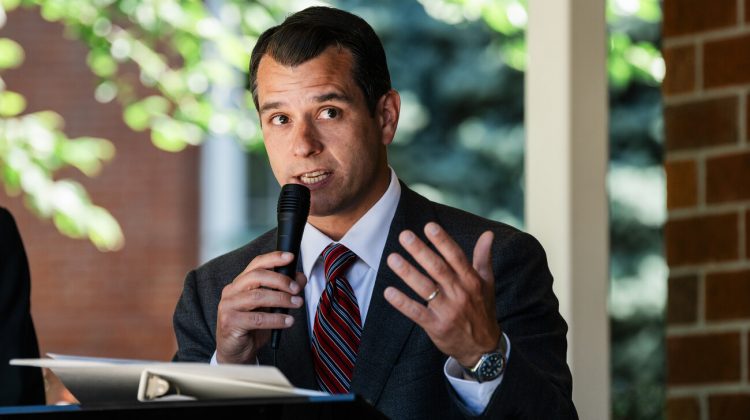LYNN — At the State of the Region address hosted by the Lynn Area Chamber of Commerce and held at St. Mary’s, Mayor Jared C. Nicholson and community leaders shared updates on waterfront revitalization, transportation upgrades, and school expansions.
“We’re growing, and we’re growing deliberately,” Nicholson told the audience, which included members of the city council, school committee, local business leaders, and state representatives. “We’re trying to grow in the right way to make sure we’re solving problems, but also opening opportunities for transformational change.”
Executive director of the EDIC, Jim Cowdell, said the long-vacant waterfront area near the bridge from Revere, once home to the dilapidated Harbor Hotel, is “the first thing people see when they come into our city,” and “that area is finally coming back to life.”
The redevelopment will include an eight-acre public park, a commercial district with restaurants and shops, and 850 residential units — 10% of which will be affordable housing. “This is the largest private investment in the city’s history,” Cowdell said, noting that the project has received city approval and is now seeking state support.
The Lynn Ferry is now seeing record-breaking ridership. In 2024, 1.42 million people rode ferries across the state, with Lynn contributing to the surge.
Last year’s highest ridership day was June 19, the day of the Celtics’ championship parade, Cowdell said. “It opens up everything. You can be in Boston in 30 minutes, then hop on another boat to Provincetown or the Harbor Islands.”
Lynn is also pushing for major transit investments, including the electrification of the commuter rail and the redevelopment of the Gear Works station to better serve West Lynn. Nicholson said the city needs rapid transit that reflects the way people live today. “The world doesn’t just work 9 to 5 anymore,” he said.
A $30 million redesign of the Lynnway, led by the MBTA, is in the planning stages, with public meetings already underway. Projects like the Blossom Street extension now allow direct access from downtown to the waterfront.
Other infrastructure efforts include sidewalk upgrades, intersection improvements at Washington and Broad Streets, and enhancements to Market Street that will connect the downtown to the waterfront.
Nicholson also noted the city’s ongoing investment in the downtown. “We’re not replacing the downtown. We’re enhancing it,” he said. “We have great bones, architecture, businesses, community.”
New decorative lighting, tree pit renovations, picnic tables in Central Square, and public art are aimed at making the downtown feel safer and more inviting, Nicholson said. A clean-up program, powered by a workforce development partnership with nonprofit Roca, is keeping the area vibrant, he said.
Nicholson said the city has incorporated nearly 1,000 new high school seats through expansions and specialized programs at the following locations: Frederick Douglass Collegiate Academy will open in the former Eastern Bank building and allow students to graduate with both a high school diploma and an associate’s degree. City Arts and Science Academy, a design- and project-based school, will open in the former Classical High School building. Lynn Tech is expanding by 200 seats, with new biotech and construction craft laborers’ programs to meet workforce demand, Nicholson said.
Nicholson said these additions to the schools provide the equivalent capacity of a new high school, without the hundred million cost of building one from scratch.
Nicholson also acknowledged challenges, especially regarding immigration enforcement and its ripple effects on the local workforce. “Whatever your politics are, people are getting caught up in enforcement who shouldn’t be,” he said. “It’s hurting our businesses, our workforce, and the comfort of customers. We’re doing everything we can, even when the solution lies beyond our control.”
Nicholson said the city will celebrate the opening of Lynn Harbor Park in just a few weeks — a 28-acre, landscaped public space with panoramic views of the harbor and Boston skyline. “It’s going to be breathtaking,” Nicholson said.
Smaller neighborhood parks, like Cook Park, are also receiving upgrades, underscoring a citywide approach to livability and equitable growth.
“I’m highlighting what I think the city’s role is in sort of setting the table for the community businesses to build on top of that,” Nicholson said.

